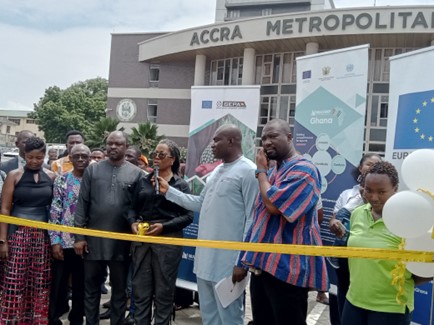The Ghana Export Promotion Authority (GEPA) has intensified efforts geared toward building the capacity of small and medium-scale enterprises (SMEs) to scale up and meet export standards through workshops and exhibitions.
The authority has introduced the West Africa Competitiveness Programme (WACOMP), a three-day event to equip local businesses with soft skills and sustainability strategies alongside a trade fair to exhibit their innovations and products to the general public.
Implemented in partnership United Nations Industrial Development Organization (UNIDO) with funding support from the European Union (EU), WACOMP provides a platform for knowledge-sharing, new ideas development, and promotion of new start-ups to national recognition.
This comes as a follow-up to earlier initiatives, such as the GEPA Impact Hub, Ghana Export School, Women Icons regional exhibitions, supply of planting materials for SME farmers, and establishment of the Ghana Trade House in Nairobi, Kenya, among others.
These capacity-building initiatives are aimed at ensuring that SMEs become export viable, especially in the area of non-traditional exports (NTEs), as the authority seeks to realise US$25billion by 2030, from the current US$3.5billion.
Chief Executive Officer of GEPA, Dr. Afua Asabea Asare, emphasised that the WACOMP aims to increase the performance and growth of the prioritised value chains and associated services by encouraging their contribution to the industry, regional trade, exports and job creation.
She added that the authority is poised to support SMEs to take advantage of the African Continental Free Trade Area (AfCFTA) to scale up and create jobs for citizens.
“The African Continental Free Trade Area has presented every SME in Africa with a great opportunity, but this opportunity is meaningless if we take things easy and go about business as done in the past. We must be deliberate with every decision and step we take, taking into account the huge market potential and benefits thereof,” she said.
A two-day WACOMP seminar to train and sharpen the skills of SMEs was also held on the sidelines of the trade exhibition to increase the performance of the private sector, promote intra-regional trade, leveraging on AfCFTA and provide certification advice and services for the businesses to be able to meet standards for export to the AfCFTA market.
Programme Director – WACOMP, Charles Sackey, stressed the need to forge partnerships that transcend borders, foster regional integration, and establish West Africa as a hub for high-quality products and services.
“We recognise the immense potential of our local products, not only in terms of economic growth but also in creating sustainable livelihoods, particularly for most of our communities. By leveraging our unique resources, expertise and entrepreneurial spirit, we can unleash the full potential of these sectors, driving innovation, creating employment opportunities, and contributing to the overall development of the subregion,” he said.
WACOMP Made-in-ECOWAS Fair
This initiative presented businesses that have received support from GEPA since 2019 with an opportunity to exhibit products covering processed fruits like mango and pineapple, cassava, cosmetics, processed food items, and personal care value chains.
The fair opened doors for SMEs from four different countries to meet at the Accra Metropolitan Assembly (AMA) forecourt to showcase innovation to the world, with representatives coming from Nigeria, Liberia, Ghana and Sierra Leone.










